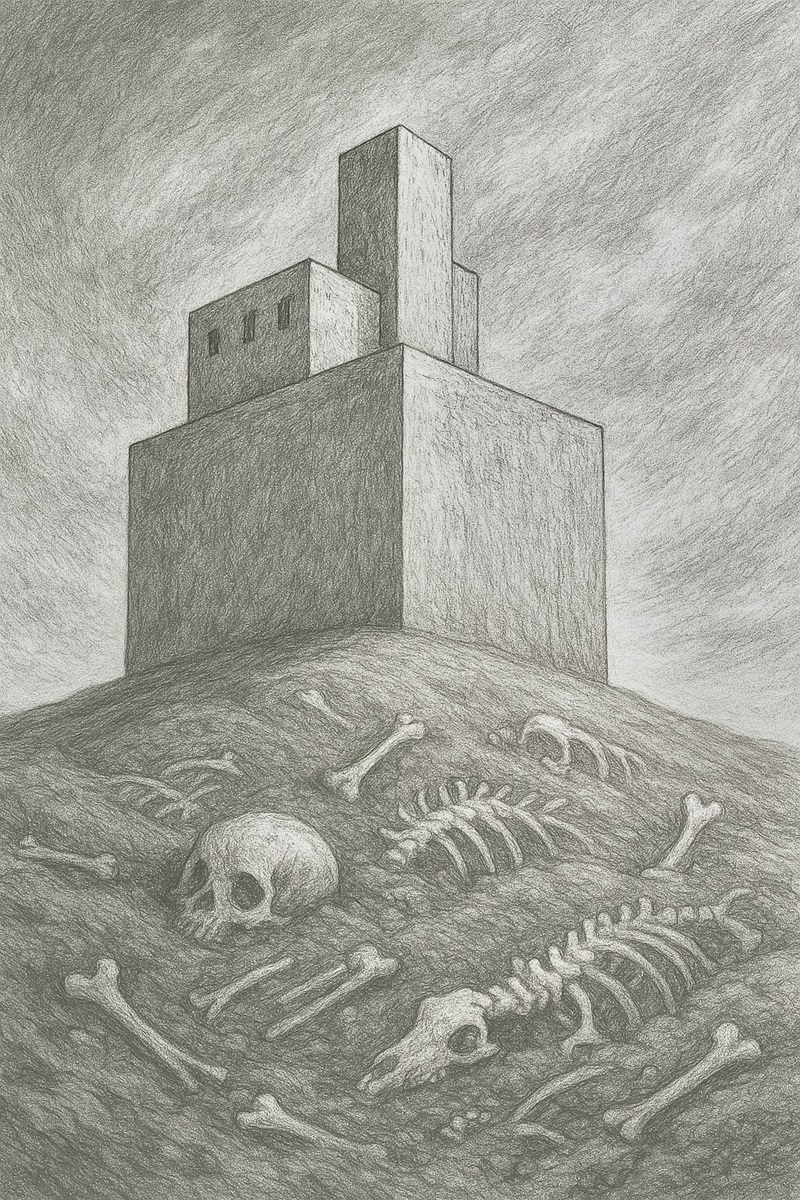一个无法自我代谢的系统,终将被牛马的骨灰所掩埋。
引子|系统不是机器,而是呼吸
世界并不因完美而持续,它因不断的坏、不断的修复、不断的转化而存活。凡是活着的东西,都会排泄、崩坏、重构。唯有死物,才试图保持永恒的形状。而一个拒绝衰败、不能重启、害怕让渡的系统,就如同一具腐而不烂的尸体,它不再是结构——而是一种体制性的幽灵。
一|何为“代谢”?
代谢,不是“更新版本”,不是“修正漏洞”。它是承认旧的已死,是在断裂中涌出的自我否定能力。一座城市的代谢,是允许街区被遗忘、被拆毁;一段关系的代谢,是承认彼此已无法再靠近;一套制度的代谢,是放下“正确曾经”,重新定义“共存”。代谢是拒绝“永远正确”,是允许死亡以生成空间。
二|牛马的骨灰从哪里来?
牛马不是自然物种,是文明的投影。它们不是某类人,而是某种存在方式:持续燃烧而无法命名。是一生重复劳动却不能留下痕迹的工人,是被吸尽时间、情感、注意力的人群,是那些“必须撑下去”,却从未被询问“为何撑”的身体。
牛马的骨灰,不是烈火的壮美残骸,它们是被遗忘、被吞噬、被使用完的声音与形式。它们沉默,它们不抗议,它们只在某一夜深人静时,落在系统的器官缝隙里,慢慢堆积成无法再忽视的重量。
三|为何系统终将被它们掩埋?
不是因为它们反抗,而是因为系统不再有空间存放死亡。不再有墓地,不再有终点,不再有退出机制。于是骨灰越积越多——不是一场革命,而是一种缓慢的淤塞,像一座城市的排水系统被头发、油脂和垃圾堵塞。它不会立刻爆炸,但终将溢出。
四|代谢能力从哪里开始?
从承认裂痕开始。当一个系统学会说“我不知道”,代谢开始了;当一个国家允许“某些制度必须消失”,代谢开始了;当一个人面对“我不再是我以为的自己”,代谢开始了。这不是失败,而是活着。不愿腐烂的人,只能慢性死亡。
尾声|谁来掩埋谁?
或许牛马们并不知道自己留下的是骨灰。他们只是在完成工作,照顾家人,挣扎着维持某种存在。而系统在高处观察,用算法记录,用政策控制,用叙事粉饰,却不知道自己已无法排出历史的老血,无法丢弃过时的器官,无法吐出早已腐坏的信念。
最终,系统会惊讶地发现:不是它崩溃了,而是它站在了一座骨灰丘上,那是它从不承认存在的人们,所留下的,唯一的墓志铭。
结语|愿世界拥有腐烂的权利
代谢,是文明的最低温的希望。拒绝代谢,不是永生,而是被缓慢埋葬。骨灰无声,但它们掩埋的,从不只是系统,而是我们曾经不愿面对的“必须改变”。
Right to Decay: When Systems Refuse to Rot, the Ashes Will Bury All
A system that cannot metabolize itself will, in the end, be buried beneath the ashes of the oxen and horses.
Prelude|The System Is Not a Machine, but a Breath
The world does not endure because it is perfect—it survives through constant breaking, mending, and becoming. All that is alive excretes, collapses, re-forms. Only what is dead seeks to preserve a permanent shape. A system that refuses decay, that fears surrender, that cannot reboot—becomes not structure, but a ghost of governance, a corpse that festers without rotting.
I|What Is “Metabolism”?
Metabolism is not an “update.” Not a “bug fix.” It is the admission that the old has died. It is the capacity to erupt from fracture, to negate the self. A city metabolizes when it allows blocks to be forgotten, demolished. A relationship metabolizes when it accepts the distance has grown irreversible. A system metabolizes when it lets go of “what once was right,” and redefines the terms of coexistence. Metabolism rejects eternal correctness. It makes room for death, that life might happen.
II|Where Does the Ash of Beasts Come From?
Oxen and horses are not natural species. They are projections of civilization. Not a kind of person, but a way of being—burning endlessly, without a name. Workers who repeat labor without imprint. Lives drained of time, attention, affection. Bodies that must “carry on” but are never asked “why.”
Their ashes are not remnants of noble fire. They are the dust of erased voices, of forms used up. They do not protest. They do not speak. They settle, unnoticed, in the crevices of the system, until one night, in unbearable silence, they begin to weigh.
III|Why Will the System Be Buried by Them?
Not because they resist. But because the system can no longer host death. No more graves. No more endings. No exits. So the ash builds. Not as revolution, but as sediment. Like a city’s drainage clogged by hair, grease, debris. It doesn’t explode. It overflows.
IV|Where Does Metabolism Begin?
It begins with the acknowledgment of rupture. When a system can say “I don’t know”—metabolism begins. When a nation permits “some institutions must die”—metabolism begins. When a person faces “I am no longer who I thought I was”—metabolism begins. This is not failure. This is the sign of life. Refuse to rot, and you begin the slow death.
Coda|Who Buries Whom?
Perhaps the beasts never knew they left behind ashes. They only worked, cared, persisted in some fragile state of being. The system, perched above, watched with data, governed with policy, camouflaged with narrative—but could no longer expel the blood of history, nor discard obsolete organs, nor vomit its rotting creeds.
One day it will realize: It did not collapse. It merely climbed atop a hill of ash—the only epitaph left by the ones it refused to see.
Finale|Let the World Have the Right to Rot
Metabolism is the coldest form of hope civilization owns. To reject it is not to gain immortality, but to be buried slowly. Ashes are silent. But what they bury was never just the system. It was everything we once refused to change.

